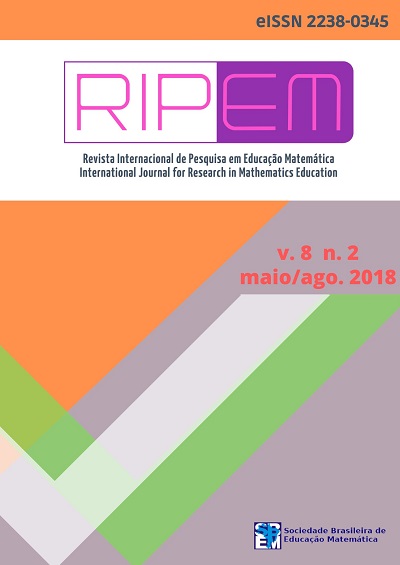PROEJA’S classroom as a space for teacher education
Palavras-chave:
Proeja, Teacher Training, Dialogue, ClassroomResumo
We developed this research focusing on the classroom as a space for teacher education, aiming at pointing out which of the teachers’ knowledges are re-signified in a mathematics classroom of Proeja-Ifes-Vitória. We emphasize the importance of a school space of interaction among the people involved, aware that although learning is an individual process, it occurs collectively. We opted for a qualitative research, based on an in-situ observation, with written records and filming that would assure us a greater proximity with the perceptions of the field of subjectivity. As a theoretical framework that discusses teacher education from a critical perspective, we use the works of Charlot, D'Ambrósio and Freire. From the results, we can point out that the openness to the transformation of Eja modality can be the foundation for a new teaching-learning process, since we saw in the classroom an articulation of knowledges, sometimes of the theoretical field and sometimes of lived experience, a clear sign of the perceptions of these teachers' knowledges. Adding that if the same process of educating while teaching follows intentionality, that is, the awareness of the fact, we may consider the exercise of self-education more likely.Downloads
Referências
ANDRÉ, M.E.D.A.de. (2010). Etnografia da prática escolar. 17ª ed. Campinas, São Paulo, 2010.
BRASIL (1996), Lei 9.394 de 20 de dezembro de 1996. Estabelece as diretrizes e base da educação nacional - LDBEN BrasÃlia, DF:Senado.
CHARLOT, B. (2005). Relação com o saber, formação dos professores e globalização: questões para a educação hoje. Porto Alegre, Artmed.
CHARLOT, B. (2000). Da Relação com o Saber: elementos para uma teoria. Porto Alegre: Artmed.
D’AMBROSIO, U. (2005). Sociedade, cultura, matemática e seu ensino. Educação e Pesquisa, São Paulo, v.31, n.1, p. 99-120, jan./abr.
D’AMBROSIO, U. (2011). Educação para uma sociedade em transição. 2.ed. Natal: EDUFRN.
FREIRE, P. (1987). Pedagogia do oprimido. Rio de Janeiro: Paz e Terra.
FREIRE, P. (1996). Pedagogia da autonomia. Rio de Janeiro: Paz e Terra.
FREIRE, P. (2011). Pedagogia da esperança. 16ªed. Rio de Janeiro: Paz e Terra.
GATTI, B.A. (Org.). (2012). Análises pedagógico-curriculares para os cursos de licenciatura vinculados à s áreas de artes, biologia, história, lÃngua portuguesa, matemática e pedagogia no âmbito da Uab e Parfor. Documento Técnico. BrasÃlia: Unesco/MEC/Capes.
LUDKE, M. & ANDRÉ, M. E.D.A. (1986). Pesquisa em educação: abordagens qualitativas. São Paulo: EPU, 1986.
MONDIN, B. (1987). Curso de filosofia: os filósofos do ocidente [tradução do italiano de Benôni Lemos; revisão de João Bosco de Lavor Medeiros]. São Paulo, ed.Paulinas, 3ªed, vl 3.
NÓVOA, A. (2007). Vidas de professores. Portugal: Porto Editora.
NÓVOA, A. (2009). Professores: Imagens do futuro presente. Lisboa: Educa.
SKOVSMOSE, O. (2007). Educação crÃtica: incerteza, matemática, responsabilidade. São Paulo: Cortêz.
SKOVSMOSE, O. (2011). Educação matemática crÃtica: a questão da democracia. 6ª edição, Campinas: Papirus.
TARDIF, M. (2002). Saberes Docentes e Formação profissional. Petrópolis-RJ: Vozes.
SHULMAN, L. S. (1986). Those who understand: knowledge growth in teaching. Educacional Researcher, v. 15, n. 2, p. 4-14.
SHULMAN, L. (1987). Knowledge and teaching: foundations of the new reform. Havard Educational Review, 1997, v.57, pp.1-22.
Publicado
Como Citar
Edição
Seção

Este trabalho está licensiado sob uma licença Creative Commons Attribution-NonCommercial-ShareAlike 4.0 International License.








